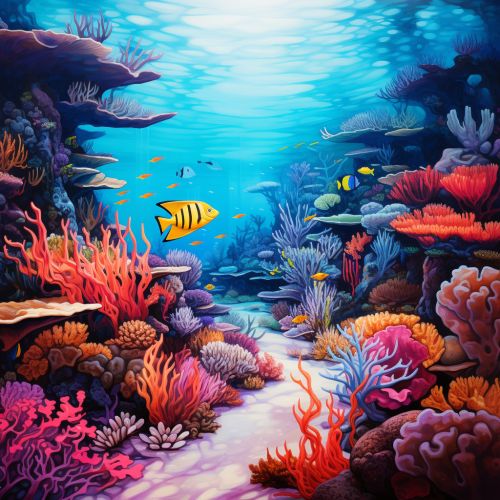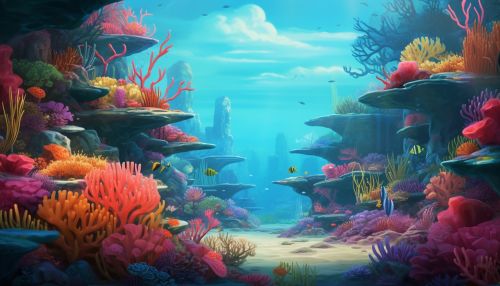The Role of Microbial Interactions in Coral Reef Ecosystems
Introduction
Coral reefs are diverse underwater ecosystems that are home to a myriad of marine life. They are often referred to as the "rainforests of the sea" due to their high biodiversity. However, these ecosystems are not just made up of corals and fish. They are also teeming with microorganisms that play a crucial role in maintaining the health and stability of the reef. This article will delve into the role of microbial interactions in coral reef ecosystems.


Microbial Communities in Coral Reefs
Microorganisms, including bacteria, archaea, viruses, and microscopic algae, are an integral part of coral reef ecosystems. These microbial communities form a complex network of interactions with each other and with the reef organisms. They are involved in various processes such as nutrient cycling, disease resistance, and coral health maintenance.
Bacteria and Archaea
Bacteria and archaea are the most abundant microorganisms in coral reefs. They form a symbiotic relationship with the corals, providing them with essential nutrients and helping them resist diseases. For instance, bacteria from the genus Vibrio have been found to be associated with healthy corals. These bacteria produce antimicrobial compounds that protect the corals from pathogenic microbes.
Viruses
Viruses, particularly bacteriophages, are also an important part of the microbial community in coral reefs. Bacteriophages are viruses that infect bacteria, controlling their population and maintaining the balance of the microbial community. They also play a role in horizontal gene transfer among bacteria, contributing to their genetic diversity and adaptability.
Microscopic Algae
Microscopic algae, or microalgae, are photosynthetic microorganisms that live in the coral tissues. They form a mutualistic relationship with the corals, providing them with organic compounds produced through photosynthesis. In return, the corals provide the microalgae with a protected environment and nutrients for growth. This symbiosis is crucial for the survival and growth of corals.
Microbial Interactions and Coral Health
The health and survival of corals are closely tied to their associated microbial communities. These microorganisms not only provide essential nutrients to the corals but also help them resist diseases and recover from stress events.
Nutrient Cycling
Microorganisms play a crucial role in nutrient cycling in coral reefs. They are involved in the transformation of nutrients, such as nitrogen and phosphorus, making them available for uptake by corals and other reef organisms. For instance, bacteria and archaea are involved in nitrogen fixation, a process that converts atmospheric nitrogen into a form that can be used by plants and animals.
Disease Resistance
Microorganisms also contribute to the disease resistance of corals. They produce antimicrobial compounds that protect the corals from pathogenic microbes. Additionally, they compete with potential pathogens for resources, preventing their proliferation and colonization.
Stress Recovery
Microorganisms help corals recover from stress events, such as bleaching. During these events, corals expel their symbiotic microalgae, leading to a loss of color and a decrease in nutrient supply. Microorganisms assist in the recovery process by providing essential nutrients and promoting the reestablishment of the symbiotic microalgae.
Impact of Human Activities on Microbial Interactions
Human activities, such as overfishing, pollution, and climate change, can disrupt the microbial interactions in coral reefs, leading to a decline in coral health and a loss of biodiversity.
Overfishing
Overfishing can alter the nutrient dynamics in coral reefs, affecting the microbial communities. It can lead to an increase in algal growth, which can outcompete the corals for space and resources. This can disrupt the balance of the microbial community, leading to a decline in coral health.
Pollution
Pollution, particularly from agricultural runoff and sewage, can introduce excess nutrients into coral reefs. This can lead to an overgrowth of certain microbes, disrupting the balance of the microbial community. It can also introduce pathogenic microbes, leading to an increase in coral diseases.
Climate Change
Climate change, particularly global warming, can lead to coral bleaching, a stress response in which corals expel their symbiotic microalgae. This can disrupt the microbial interactions in coral reefs, leading to a decline in coral health and a loss of biodiversity.
Conclusion
Microbial interactions play a crucial role in maintaining the health and stability of coral reef ecosystems. They are involved in various processes, such as nutrient cycling, disease resistance, and stress recovery. However, human activities are disrupting these interactions, leading to a decline in coral health and a loss of biodiversity. Therefore, it is crucial to mitigate these impacts and protect these valuable ecosystems.
